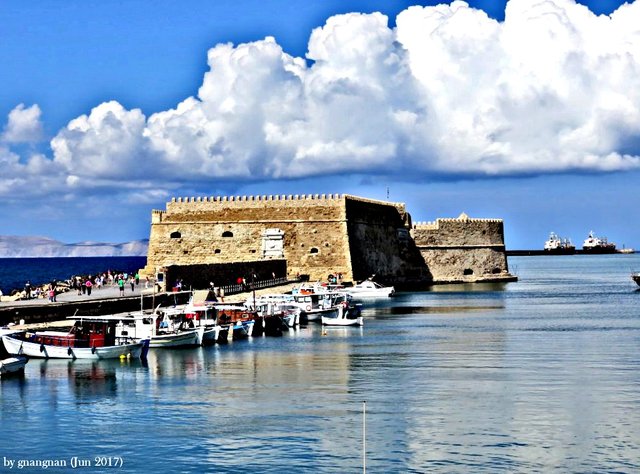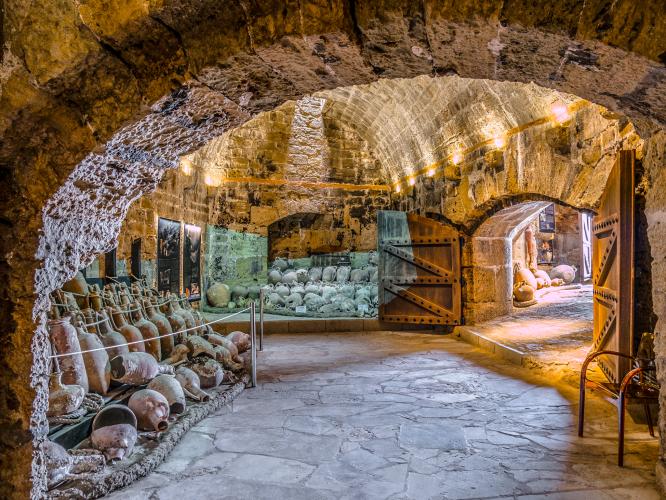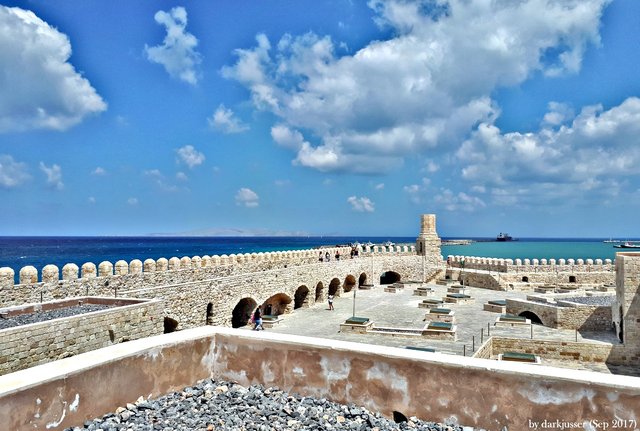Rocca A Mare (Koules) in Heraklion: Step back in time and enjoy the breathtaking views!
The imposing 500 year old Fortress dominates the entrance of Heraklion’s old port, being one of the most emblematic symbols of the city.
This Venetian Fortress in its current form was shaped during the 16th century, after replacing a previous construction that was destroyed by an earthquake in 1508.

image by gnangnan
A sketch made by Christofor Buondelmonti in 1415 depicts a beacon-tower that probably stood since the 7th or 8th c. A.D to confront with the Arab threat.
The construction of the fortress as is, started in 1525 and was completed in 1540.
After 1669, the Ottomans made alterations to the fortress and called it Su Kulesi (which means the Fotress of the Water). The name Koules prevails to this day.
The fortress consisted of two floors and was built with big blocks of stone.
Its ground floor housed 26 rooms, where captains used to stay and stored food & ammunition.
Some minor Ottoman interventions on the upper parts include a minaret and a few stone battlements for their musketeers. During the Turkish occupation, many of the castle’s dungeons were used as prison for the Cretan revolutionaries.
A less known fact is that a smaller fortress has been constructed next to Rocca a Mare by the Turks. This was called Little Koules but was demolished in 1936 along with part of the Venetian shipyards.
What you will see in the fortress
Many of its ground floor rooms are open to the public. You can visit the hall with the Venetian sculptures (inscriptions etc) as well as a hall in which a documentary is displayed.
There is a room with a variety of treasures discovered by Jacques-Yves Cousteau and an impressive room which contains the canons of La Therese ship found by Cousteau in 1976 between Heraklion and the island of Dia.
La Therese was a ship sent to assist the Venetians during the Ottoman siege of Candia, but was sinked with all the men after an explosion.

image courtesy of http://koules.efah.gr/koules
Apart of the exhibits in the ground floor, you will be impressed by the architecture of the fortress. Information signs are placed in various spots, providing useful historical info.
You may enjoy a digital tour here
Extra tips:
- During the summer time, cultural events usually take place on the open air theatre of Koules. Make sure to be informed in advance and not to miss this opportunity!
- This Venetian landmark is also crowned with the Lion of Saint Mark above the entrance.
- If you have half an hour (or plus) to spare you can walk an extra 2.5km to the light house, located at the end of the road after Koules.
- Info: The fortress interior remain closed to the public for years due to extensive restoration works. It opened its gates again in August 2016 and proudly reveals its history to the visitors.
Contact Information
Telephone: 2810243559 (landmark), 2810288484(Heraklion)
Fax: 2810288484
Email: [email protected]
Tickets:
Full: €2, Reduced: €1
Ticket: 2 euros Reduced ticket 1euro (visitors from 1/11 to 31/3)
Opening Hours
From 01/11/2017 08:00-15:00 (last admission: 14:30)
In the summer time it is usually open until 19:00, make sure to check their schedule prior to your visit.
Free admission days
6 March (in memory of Melina Mercouri)
18 April (International Monuments Day)
18 May (International Museums Day)
The last weekend of September annually (European Heritage Days)
28 October
Every first Sunday from November 1st to March 31st
This article includes information from:
Official site for Koules
Images by TripAdvisor
Ministry of Culture
Explore Crete
Heraklion Municipality

image by darkjusser
Some indicative visitors' reviews by TripAdvisor
By jenjen8537 – Dublin, Ireland
Quick trip
Well worth a trip here we stayed in hersonissos and got the bus 3.30 each way On we paid entrance fee of 8€ for 4 adults 2 teens a 3 year old and babies
Was a lovely little place with great information and great views all around would recommend to all
By BT3rd, Windsor United Kingdom
Fascinating
This is a well preserved fortress that has been restored. €2 was a bargain to get inside. In the caverns below there were some good information written in Greek and English about the great siege. Also a canon ball repository and some canons.
Up top it was very sterile all very ‘new’ looking but worth a stroll around the battlements.
By Panagiotis N – Piraeus Region, Greece
Πανσέληνος στο λιμάνι
Φεύγοντας από τον Πειραιά με πανσέληνο, φτάνεις το επόμενο πρωϊνό στο λιμάνι του Ηρακλείου και απολαμβάνεις τη δύση της πανσελήνου πίσω από τα βουνά, υπέροχο θέαμα
By TripScrutineer Surfers Paradise, Australia
Venetian Fortress - A Wander Back In History
The "Castello del Molo" is a fortress located at the entrance of the old port of Heraklion. It was built by the Republic of Venice in the early 16th century, and is still in good condition today. We walked through the old fort which was built with immensely thick walls and ceilings. The fort is original and maintenance to keep it preserved has been done in a manner that has maintained its ancient authenticity. We spent an hour or so wandering around the fort, going up onto its roof and walking around its perimeter walls. The views from atop the perimeter walls of the harbour, marine craft, and city are wonderful. Well worth the 2 Euro to visit and explore when in Heraklion.
Reviews by Google
By Andrew Willcox
Very pretty place in a pretty Venetian port. The scenery around it is perfect for photos and it's all very close to a bustling city. Drinks and snacks are readily available close by. The only warning I’d give personally is it was VERY easy to waste away hours here as I found it difficult to drag myself from the views. Add an extra hour to your itinerary for this place and MAKE SURE you exit via 25th of August Street.
By Jesse Skura
At only 2€ per person (1€ for students and free if under 18), this is a fantastic historical landmark. The structure has been well restored and maintained. Information boards tell the story behind the fortress, in Greek and in English. Very neat to see canons and anchors that were recovered from when the harbour was first inhabited.